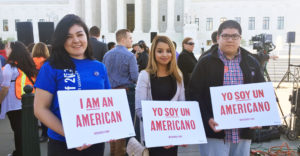FOR IMMEDIATE RELEASE
July 18, 2016
CONTACT
Juan Gastelum, [email protected], 213-375-3149
NILC Applauds Justice Department Request for Rehearing in U.S. v. Texas
LOS ANGELES — Following a Supreme Court deadlock in June that left millions of immigrant families across the country in limbo, the U.S. Department of Justice today filed a motion for rehearing in United States v. Texas, the case involving the Obama administration’s 2014 immigration executive actions.
If granted, a rehearing would allow both sides to reargue the case before the nation’s highest court after a ninth justice is confirmed, making it much less likely that the result would remain a stalemate. A favorable decision in the case would provide much-needed clarity for the country and finally free up for implementation the administration’s deferred action initiatives, known as Deferred Action for Parents of Americans and Lawful Permanent Residents (DAPA) and the expansion of Deferred Action for Childhood Arrivals (DACA).
Marielena Hincapié, executive director at the National Immigration Law Center, issued the following statement:
“The Supreme Court failed millions of immigrant families, and our country as a whole, when it deadlocked in U.S. v. Texas. Now, the justices have an opportunity to right this wrong and fulfill their duty to the American people.
“U.S. v. Texas is without a doubt one of the most consequential immigration cases in recent history. It is appropriate and, in fact, necessary for the Court to rehear the case with a full bench and deliver a decisive ruling. We commend the Justice Department for taking a necessary first step toward ensuring that those whose lives are hanging in the balance get a fair day in court. We hope the Supreme Court will recognize that the millions of families living in limbo—and our country as a whole—deserve better than a nondecision. We beseech the justices to grant a rehearing.”
Announced by the Department of Homeland Security in November 2014, DAPA and the expansion of DACA are programs intended to build off the success of the administration’s 2012 DACA initiative, which allows eligible undocumented youth who were brought to the U.S. as children to live and work here temporarily without fear of deportation. DAPA would extend similar benefits to certain undocumented immigrants whose children are U.S. citizens or permanent residents, while the expansion of DACA would broaden eligibility for DACA, making the program available to a larger range of people.
The original (2012) DACA initiative was not challenged in U.S. v Texas and remains open to eligible applicants.
# # #






